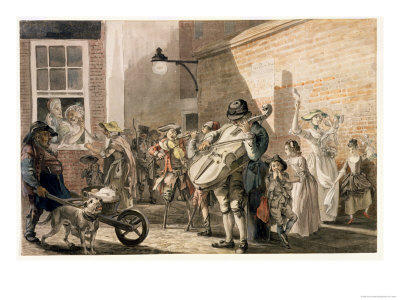I’ve made several posts for Blog Action Day, and today’s topic is inequality. In the U.S., there is a staggering inequality of access for music education, and more importantly, for classical music. This is a conscious decision made by hundreds of school districts, municipalities, school boards, and other governing bodies across not only the United States, but the world.
As an example, some years ago I went to several of my local school districts with a grant proposal for $55,000.00 to give classical music lessons after school; this would have included everything necessary except the classroom. Four different school districts listened to me for less than five minutes each, and said, “No, thanks.” When I asked why, they just shrugged. One of the people who abstained from voting later told me, “Classical music is elitist.”
The truth is that anyone, regardless of race, creed, color, sexual orientation, disability (except
deafness) or ability to pay can listen to classical music. Even those who are deaf can learn to play. You don’t have to have any special gifts or talents. You don’t have to come from a certain cultural background, because it’s free to listen to. Many internet stations, many college stations, and our local city station all play classical music, some 24/7.
It is the people in power who are trying to guarantee that classical music is elitist. How?
- The focus in classical music is on white male European composers (there are plenty of composers from all different countries, of all different races and genders);
- Classical music is considered as an “extra” available to those willing and able to pay for instruction;
- Classical music is being eliminated from public schools as an unnecessary luxury;
- Classical music radio stations are being pressured to “broaden their appeal” by playing other types of music (this music is freely available on other stations).
To redress this inequality, we must:
- Embrace and promote the classical music written outside Europe, music written by women, and composers of color;
- Return classical music and learning to play music to regular classroom instruction;
- Promote the benefits of classical music (as I do here in my blog);
- Promote more avenues to hear and perform classical music.
And for those who say that classical music is dying, I have news for you. Since 2000, in the United States alone, more than two hundred companies who give one or more opera performances a year have been started. That’s more than ten new opera companies a year. The same holds true for classical music ensembles: string quartets, madrigal groups, wind bands, and the like. One single simulcast opera performance in Cowboys stadium each year attracts fifteen thousand audience members, some from neighboring states. With that kind of growth, classical music isn’t going to die any time soon; its audience keeps growing as new generations discover it. To ensure it survives, new generations have to be able to have access!


While classical is not a genre I’ve had much exposure to, I see where you’re coming from in your explanation for how it’s been pushed aside. The only composers I can think of are Euro males, I remember how expensive the orchestra option was in school (at least it was offered), and most extra curricular activities (other than football) are now being downsized in an attempt to curb ever decreasing scores in ‘core’ classes.
I applaud you for being such a champion of your art form.
I live in a school district that has both orchestra and band in the middle and high schools. My youngest daughter learned and played the bassoon from 6th grade through high school. It is very unfortunate that the schools don’t see the advantage of children learning to play an instrument. The additional sense of accomplishment and the opening of their minds to the ability to create is as important as the abcs and math. Children should be given the opportunity to learn all kinds of music.